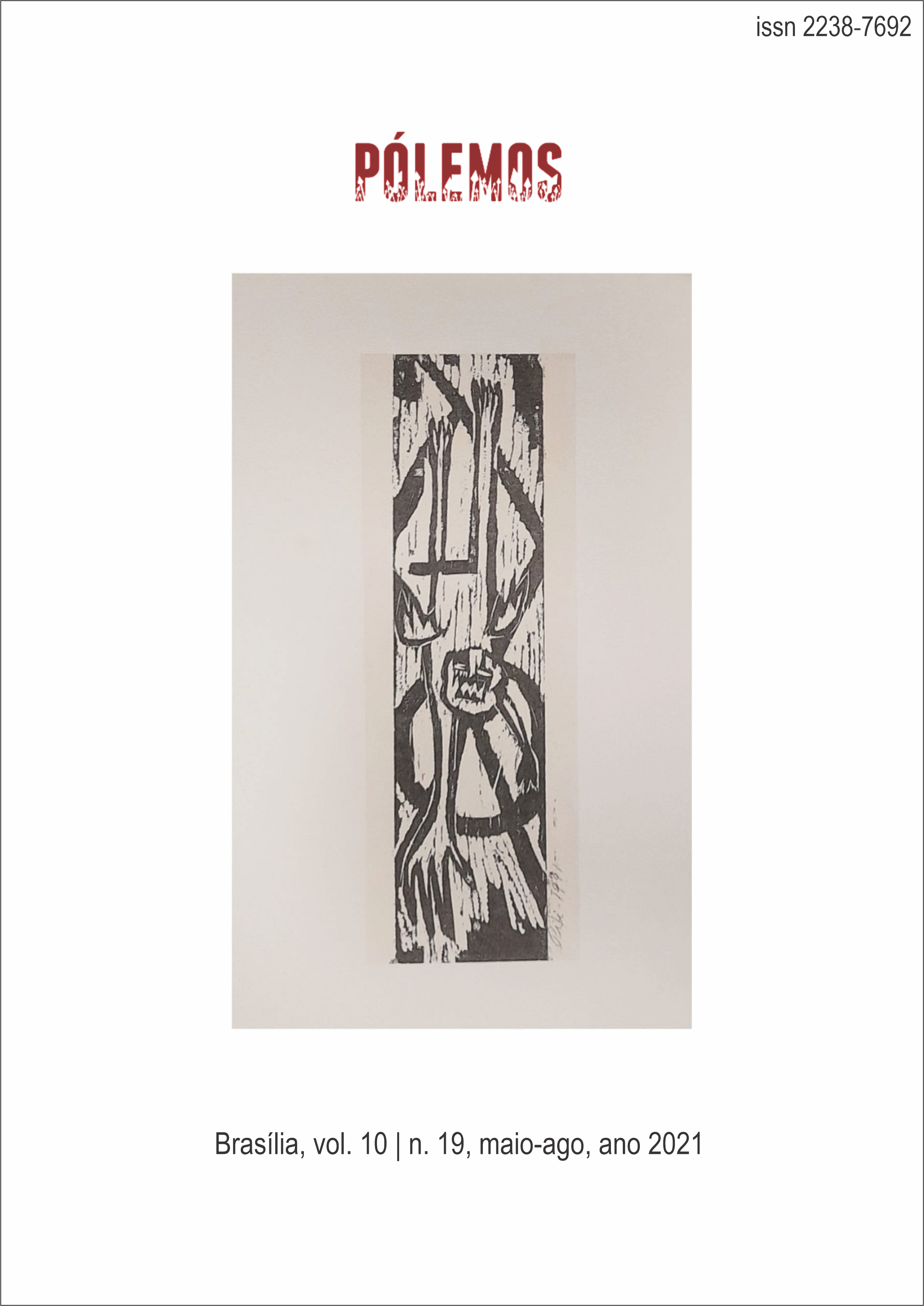THE ELECTIVE AFFINITIES BETWEEN WALTER BENJAMIN (1892-1940) AND FRANZ KAFKA (1883-1924)
tradition, melancholy and autonomy
DOI:
https://doi.org/10.26512/pl.v10i20.38774Keywords:
Franz Kafka. Walter Benjamin. Modernity. Experience. Tradition.Abstract
The present work discussed the writings of Walter Benjamin (1892-1940), prominent German philosopher, about the Czech writer Franz Kafka (1883-1924). The main goal was to investigate the historical context in which both authors shared ideas. In addition, the concepts of experience (Erfahrung), ill tradition and oblivion were chosen in order to understand the dialogues between Benjamin and Kafka, also united by their Jewish heritage. We sought to define these three concepts, because their proximity does not allow them to be separated, as we analyze the essays and letters from Benjamin about Kafka. Thus, the correspondences between Benjamin and Gershom Scholem were fundamental. We also analyzed Kafka’s short-stories and novels, comparing them with Benjamin’s essays and letters about him. Finally, we analyzed the authors’ view of the problem of the decline of tradition.
Downloads
References
ADORNO, T. W.; HORKHEIMER, M. Dialética do esclarecimento: fragmentos filosóficos. Trad. Guido Antônio De Almeida. Rio de Janeiro: Zahar, 2006.
ARENDT, H. Origens do totalitarismo. Trad. Roberto Raposo. Edição de bolso. São Paulo: Companhia das Letras, 2013.
BENJAMIN, W. Carta a Gershom Scholem de 12 de Junho 1938. São Paulo. Revista Novos Estudos, v. 35, pp. 100-106, 1993a.
BENJAMIN, W. Carta de 20 de Julho de 1934. In: SCHOLEM, G. (Ed.). Correspondência Walter Benjamin – Gershom Scholem. São Paulo: Editora Perspectiva, 1993b.
BENJAMIN, W. Franz Kafka: Beim Bau der Chinesischen Mauer. In: JENNINGS, M. W.; EILAND, H.; SMITH, G. (Eds.). Walter Benjamin: Selected Writings. Trad. Rodney Livingstone. Cambridge, Massachusetts, and London, England: The Belknap Press of Harvard University Press, 1999. v. 2.
BENJAMIN, W. Franz Kafka: a propósito do décimo aniversário de sua morte. In: BENJAMIN, W. Magia e técnica, arte e política. Trad. Sérgio P Rouanet. 8 ed. São Paulo: Brasiliense, 2012a.
BENJAMIN, W. Experiência e pobreza. In: BENJAMIN, W. Magia e técnica, arte e política. Trad. Sérgio P Rouanet. 8 ed. São Paulo: Brasiliense, 2012b.
CARONE, M. Uma carta notável. In: KAFKA, F. Carta ao pai. São Paulo: Companhia das Letras, 1997.
CASANOVA, P. Kafka, Angry Poet. Trad. Chris Turner. London; New York: Seagull Books, 2015.
COUTINHO, C. N. Franz Kafka, crítico do mundo reificado. In: COUTINHO, C. N. Lukacs, Proust e Kafka: literatura e sociedade no século XX. Rio de Janeiro: Civilização Brasileira, 2005.
EISENBERG, R. L. Dictionary of Jewish Terms: A Guide to the Language of Judaism. Rockville, MD: Schreiber Publishing, 2008.
GAGNEBIN, J. M. Memória, história, testemunho. In: GAGNEBIN, J. M. Lembrar, escrever, esquecer. São Paulo: Editora 34, 2009a.
GAGNEBIN, J. M. Verdade e memória do passado. In: GAGNEBIN, J. M. Lembrar, escrever, esquecer. São Paulo: Editora. 34, 2009b.
GAGNEBIN, J. M. Homero e a dialética do esclarecimento. In: GAGNEBIN, J. M. Lembrar, escrever, esquecer. São Paulo: Editora 34, 2009c.
GAGNEBIN, J. M. O rastro e a cicatriz: metáforas da memória. In: GAGNEBIN, J. M. Lembrar, escrever, esquecer. São Paulo: Editora 34, 2009d.
KAFKA, F. Uma mensagem imperial. In: KAFKA, F. Um médico rural. Pequenas narrativas. Trad. Modesto Carone. São Paulo: Brasiliense, 1990.
KAFKA, F. Carta ao pai. Trad. Modesto Carone. São Paulo: Companhia das Letras, 1997.
KAFKA, F. O silêncio das sereias. In: KAFKA, F. Narrativas do espólio (1914-1924). Trad. Modesto Carone. São Paulo: Companhia das Letras, 2002.
KAFKA, F. O processo. Trad. Modesto Carone. São Paulo: Companhia das Letras, 2005.
KAFKA, F. A metamorfose. Trad. Modesto Carone. São Paulo: Companhia das Letras, 2012.
LÖWY, M. Messianismo judaico e utopia libertária: das “Correspondências” à “Attractio Ellectiva”. In: LÖWY, M. Redenção e Utopia. 2 ed. São Paulo: Editora Perspectiva, 2020a.
LÖWY, M. Redenção e utopia. 2 ed. São Paulo: Editora Perspectiva, 2020b.
LÖWY, M. “Theologia Negativa” e “Utopia Negativa”: Franz Kafka. In: LÖWY, M. Redenção e utopia. 2 ed. São Paulo: Editora Perspectiva, 2020c.
MANNHEIM, K. Ideology and Utopia: An Introduction to the Sociology of Knowledge. Trad. Louis Wirth. Mansfield Centre, CT: Martino Publishing, 2015.
OLANO MORGANTTI SALUSTIANO BOTELHO, L. WALTER BENJAMIN E AS IMAGENS DA HISTÓRIA: possibilidades de uma crítica social a partir da arte. PÓLEMOS – Revista de Estudantes de Filosofia da Universidade de Brasília, [S. l.], v. 1, n. 1, p. 104–122, 2012. DOI: https://doi.org/10.26512/pl.v1i1.11485. Acesso em: 17 ago. 2021.
SANDROW, N. Vagabond Stars: A World History of Yiddish Theater. Syracuse: Syracuse University Press, 1996.
SCHOLEM, G. Correspondência Walter Benjamin – Gershom Scholem. Trad. Soliz Neusa. São Paulo: Editora Perspectiva, 1993.
SCHOLEM, G. Revelation and Tradition as Religious Categories in Judaism. In: SCHOLEM, G. The Messianic Idea in Judaism and Other Essays on Jewish Spirituality. New York: Schocken Books, 1995. p. 376.
UNTERMAN, A. Dictionary of Jewish Lore and Legend. New York, NY: Thames and Hudson, 1991.
Downloads
Published
How to Cite
Issue
Section
License
Copyright (c) 2021 PÓLEMOS – Revista de Estudantes de Filosofia da Universidade de Brasília

This work is licensed under a Creative Commons Attribution-NonCommercial-NoDerivatives 4.0 International License.
Todos os trabalhos que forem aceitos para publicação, após o devido processo avaliativo, serão publicados sob uma licença Creative Commons, na modalidade Attribution-NonCommercial-NoDerivatives 4.0 International Public License (CC BY-NC-ND 4.0). Esta licença permite que qualquer pessoa copie e distribua a obra total e derivadas criadas a partir dela, desde que seja dado crédito (atribuição) ao autor / Ã autora / aos autores / às autoras.


